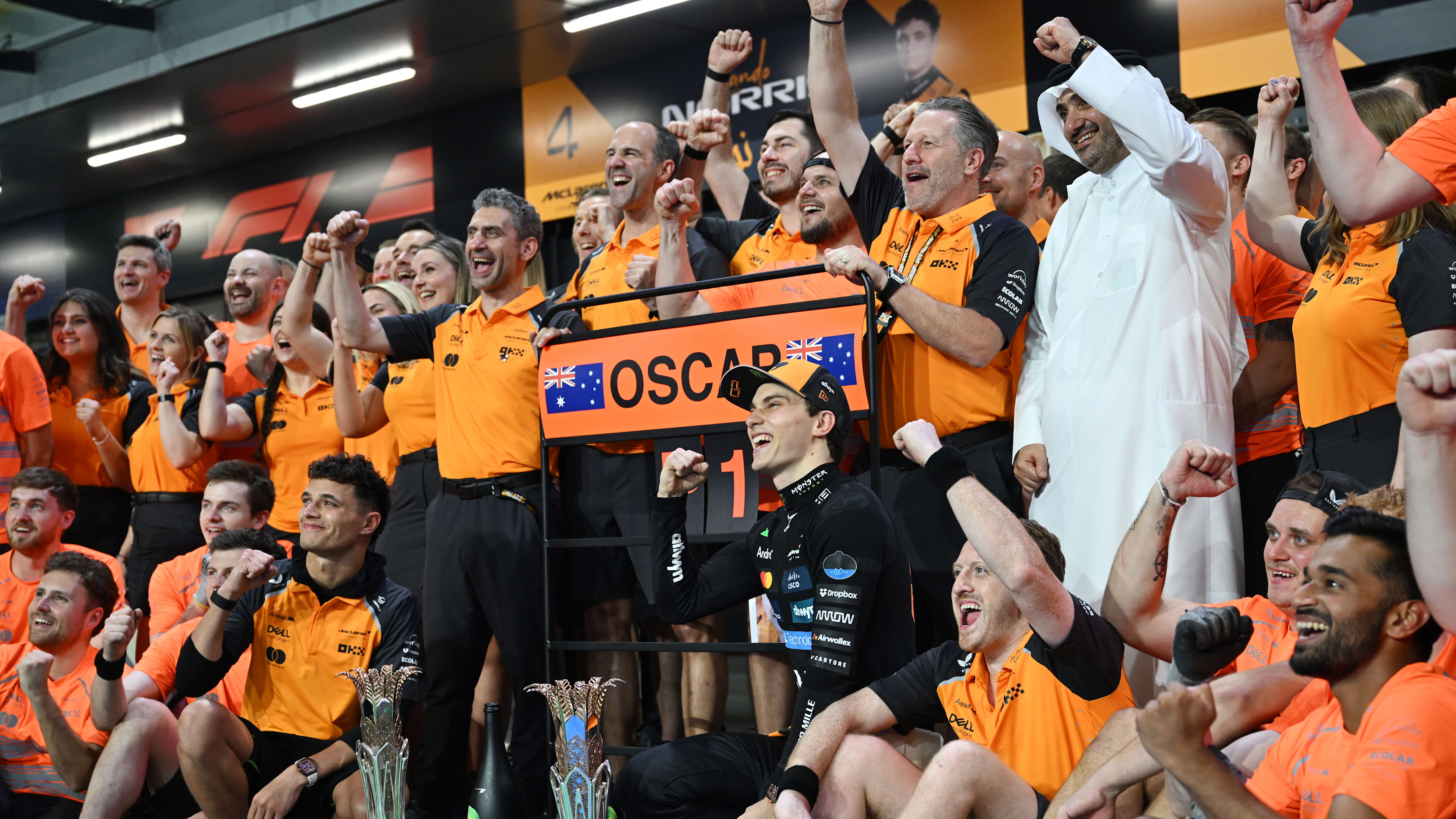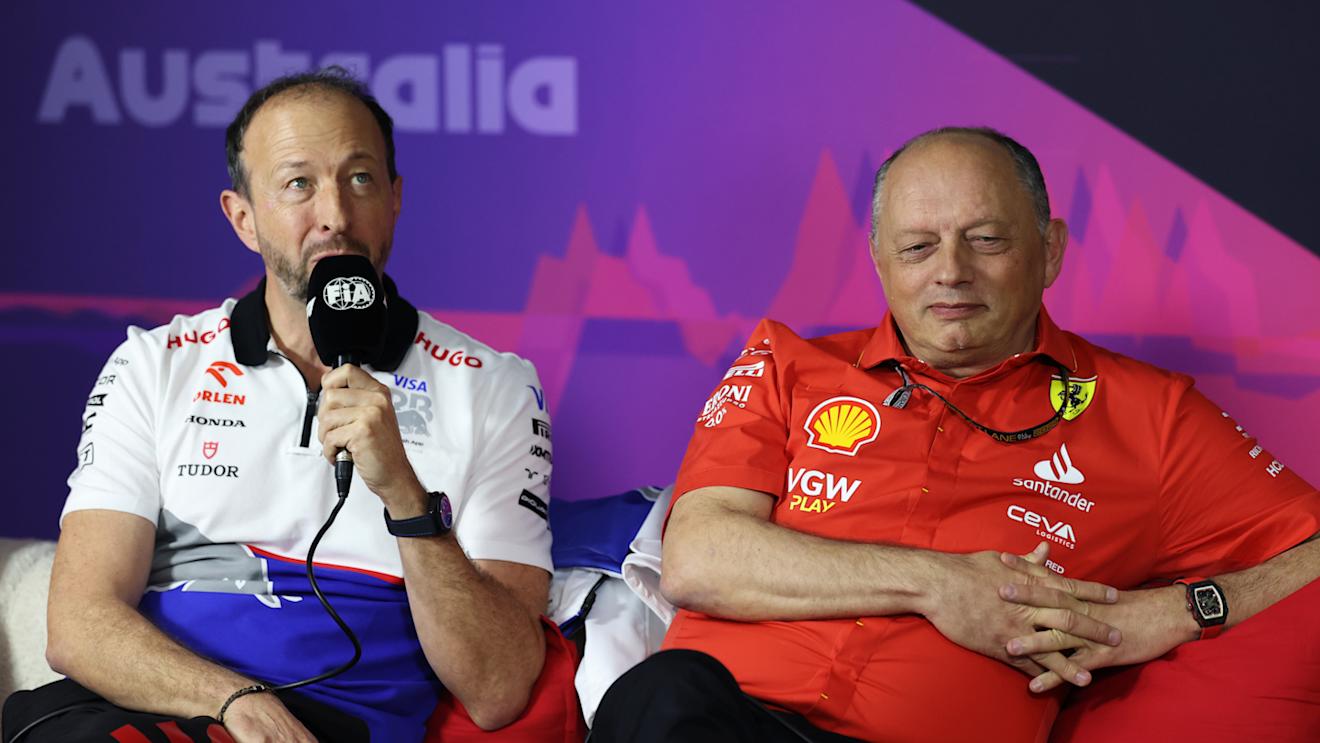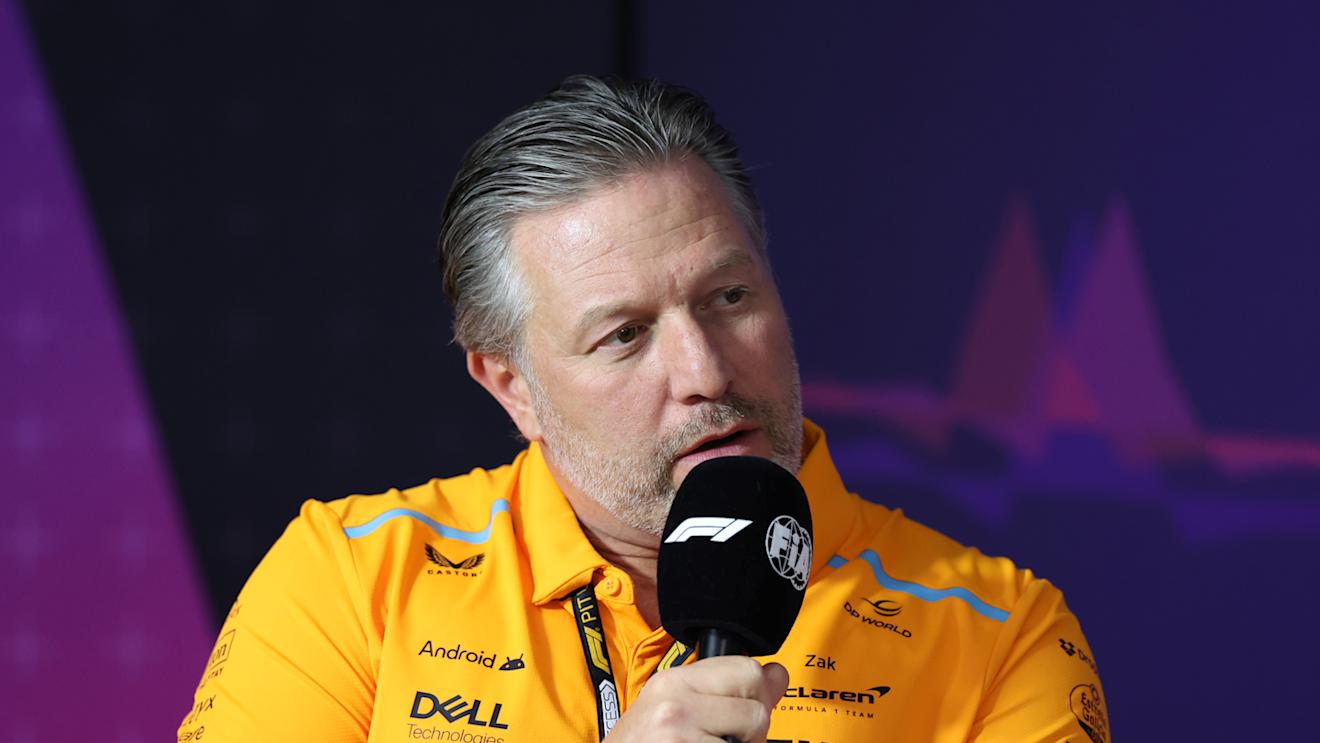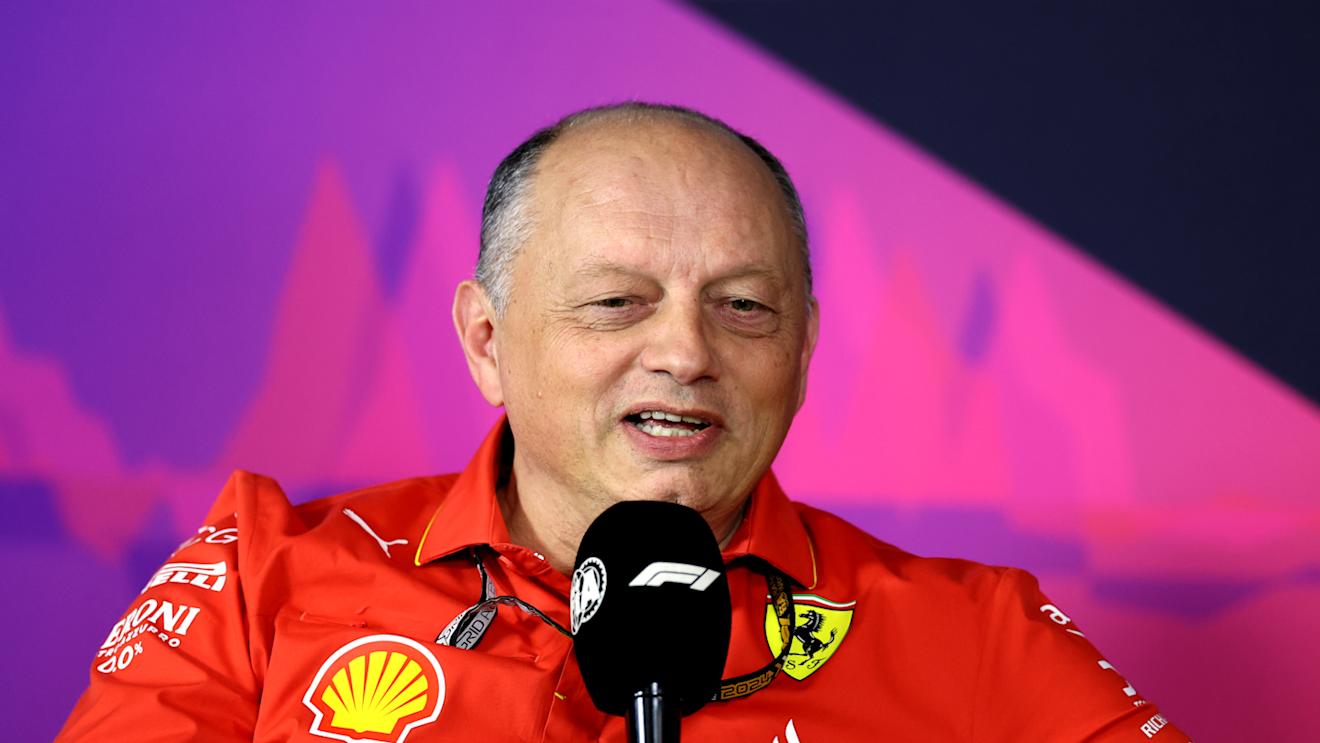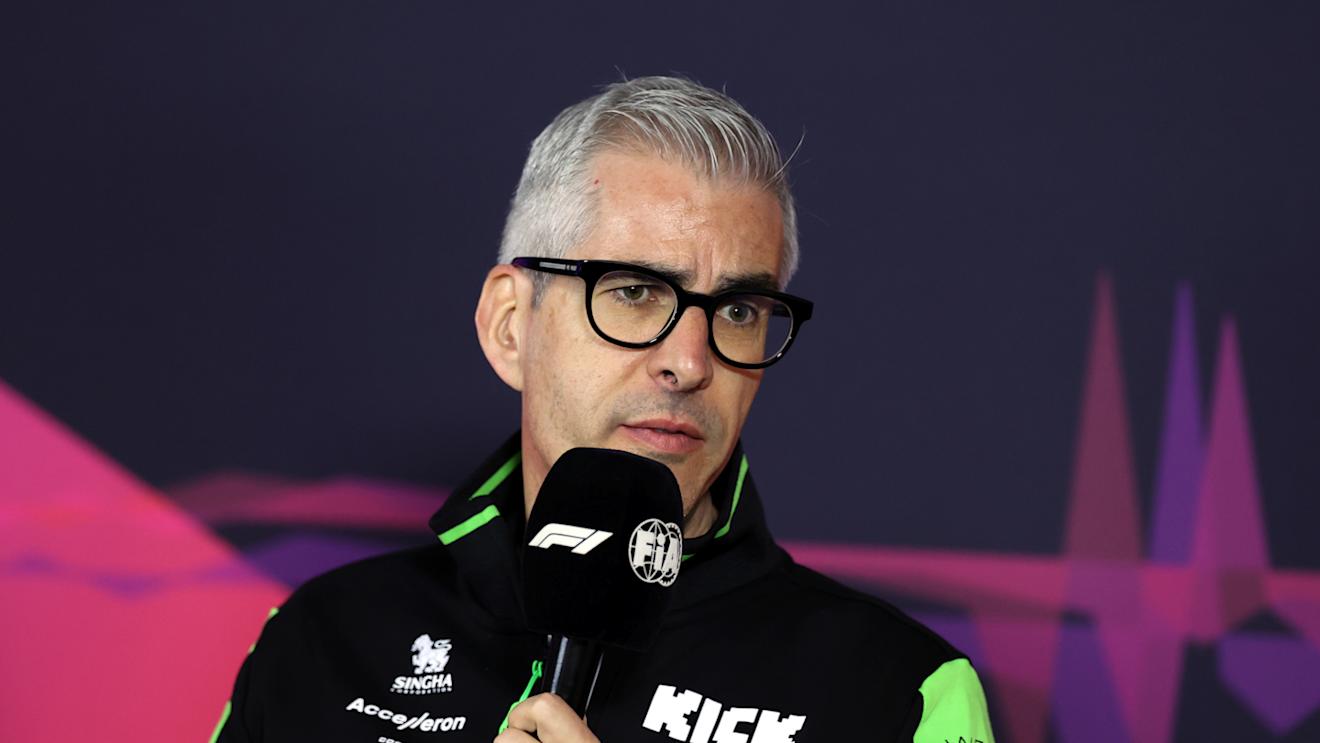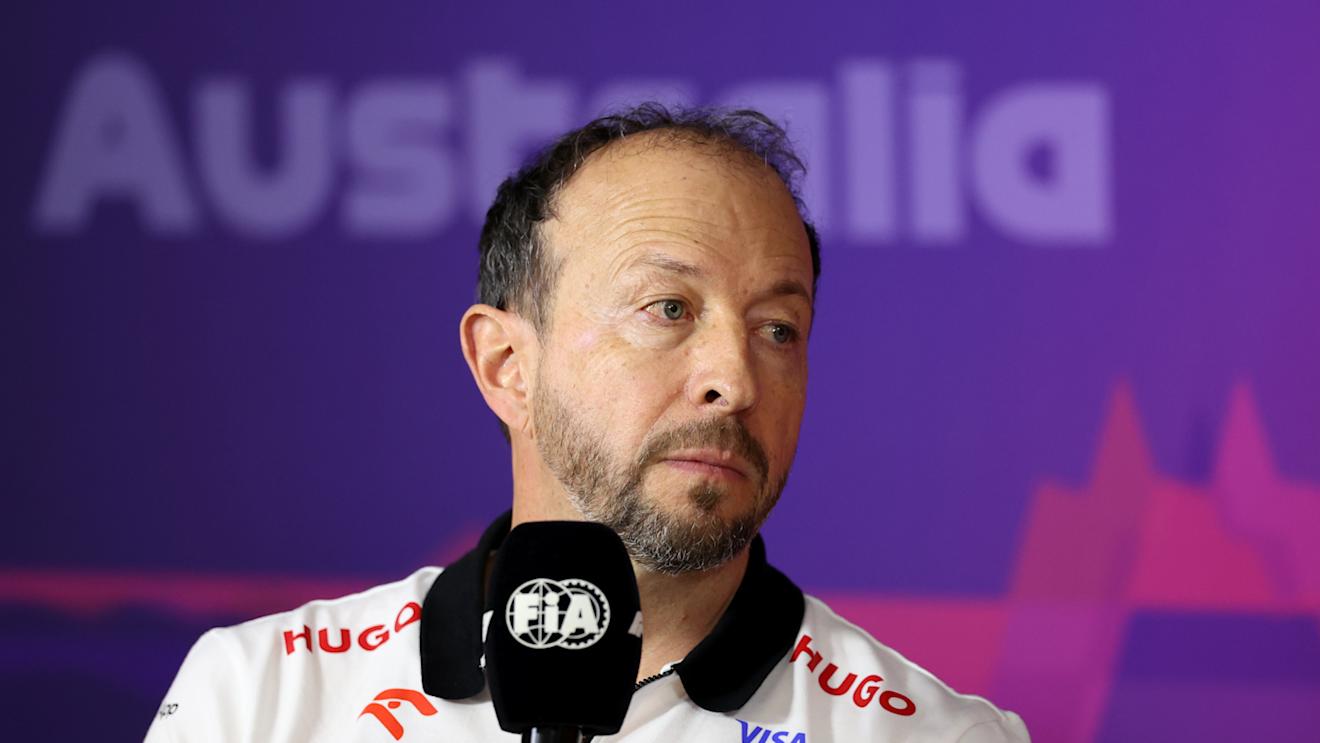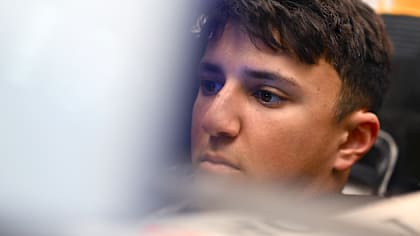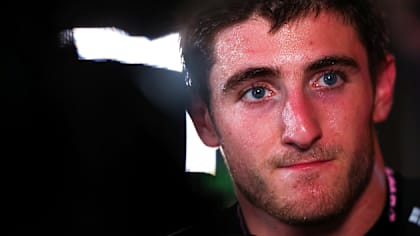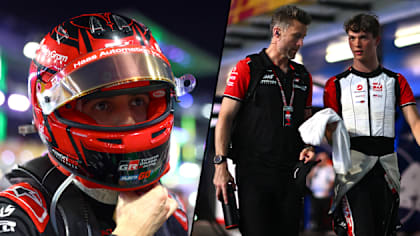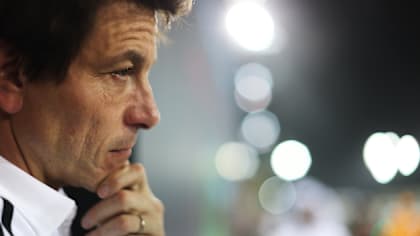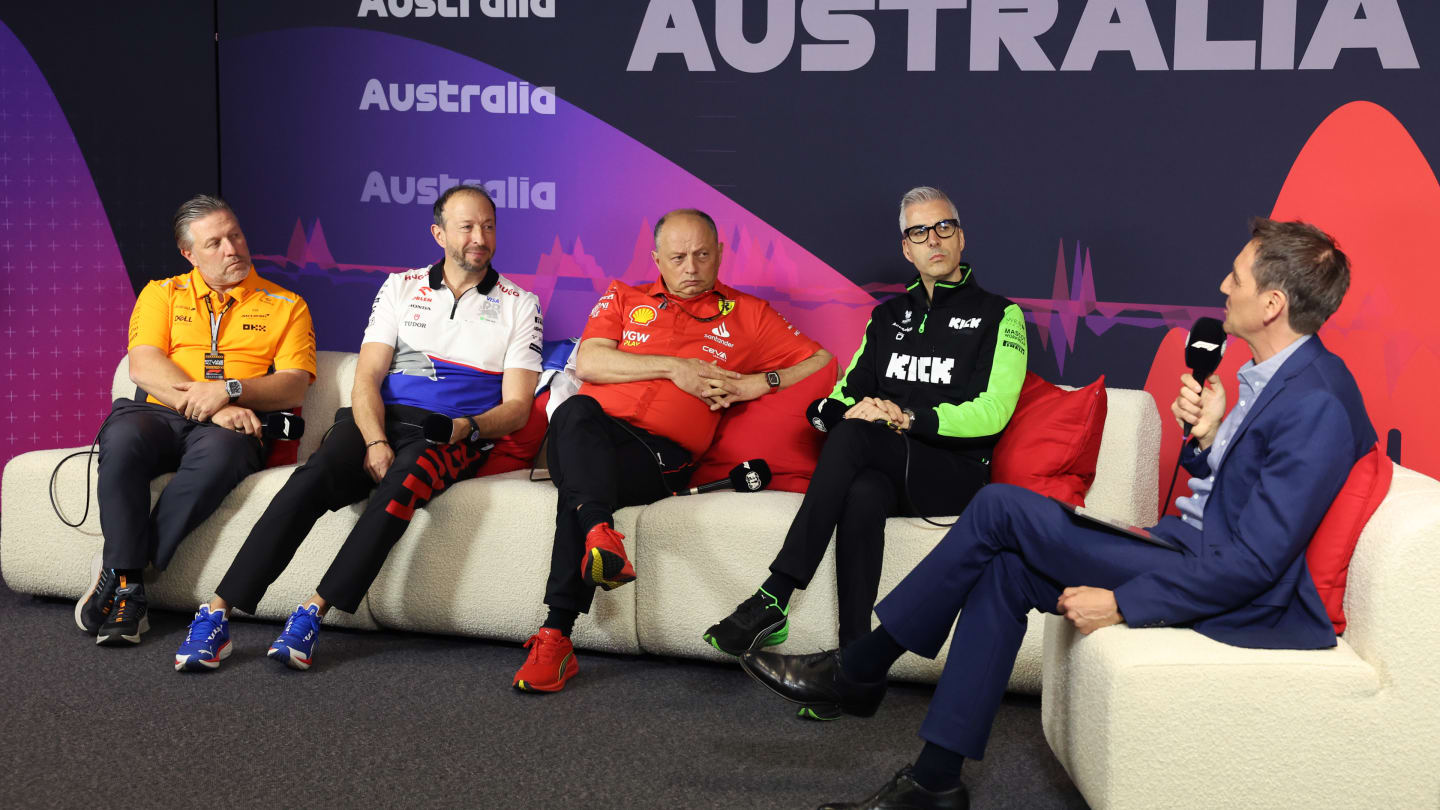
News
FIA team principals press conference – Australia
Share

TEAM REPRESENTATIVES: Zak BROWN (McLaren), Peter BAYER (RB), Frédéric VASSEUR (Ferrari), Alessandro ALUNNI BRAVI (Kick Sauber)
Q: Fred, I feel we should start with you. Carlos Sainz, he did more than 20 laps in FP1. How is he?
Frédéric VASSEUR: I would say, so far so good. He was a little bit on the back foot the first couple of laps and then step by step he came back pretty well. I think he's optimistic for the rest of the weekend.
Q: Is he in any pain?
FV: So far, no. If he had the pain, it would have been a big issue. So far, all OK and it's under control.
Q: So you're confident that he will do the rest of this Grand Prix weekend?
FV: Yeah, I'm not a doctor at all, but I'm confident.
Q: Now, Ollie Bearman has, of course, been on standby just in case this weekend. A lot of people in here heaped praise on Ollie after what he did for you in Saudi. Can we just get your reflections on that weekend and the job he did after such a late call-up?
FV: I think there are pros and cons. For sure, it was a very late call, because I called him two hours before FP3, I think, something like this. At least he didn't have time to think too much about the situation. It was the positive of this. And then he did a mega job all over the weekend. For sure, it's difficult. It's even more difficult to start in Jeddah and to miss FP1, FP2. And he was able to put everything together from the quali, that he was, I think, a couple of thousands off Q3. And then in the race, he was very consistent until the end. But he did a perfect job, I think, all the team was more than happy with what Ollie did. And it's not just about the result, it's the behaviour all over the weekend. And so it was perfect.
Q: You say perfect. You've worked with so many young drivers over the last 30 years. Have you seen anything better?
FV: I'm not so old!
Q: Have you seen anything better than what Ollie achieved?
FV: We have to avoid to draw any conclusion, that it's far too early. Now he has to be focused on the F2 and I'm sure that all the journalists, the press and so on will draw a conclusion after the end of the championship, if he's not winning the F2, but we have to do it to take it step by step. He did very well in Jeddah. He will have the occasion to do other FP1s into the season. He will do some tests and so on but the main focus for him is also to be the GP2, sorry the F2!
Q: Final one from me. The SF24. Do you feel you're closer to Red Bull than you were this time last year?
FV: It's not the feeling. Last year in Jeddah, in the race, we were something like one second off. And this season, we are perhaps four tenths. For sure, we are much closer to Red Bull than one year ago, but we are still behind. The business is to be first, it's not to be second and not too far away. For sure, we are in the right direction. We have to continue to develop, but we are still behind.
Q: Thank you very much. Zak, if we could come to you now. Coming into Melbourne a year ago McLaren were last in the Constructors’ Championship. You're currently lying third. What a difference 12 months makes.
Zak BROWN: Yeah, it's a lot better this time around. This was the first race where we scored points last year, and even then we inherited quite a few after the incident at the very end of the race. But all the men and women at McLaren are continuing to do a fantastic job. I feel like we've kind of picked up where we left off the second half of last year. The field has never been closer, so we need to continue to push hard, but I think we've designed and developed a very strong racing car that will hopefully get stronger, but we know the other nine teams are not sitting still. Our drivers are doing a great job. We've got a lot of harmony in the racing team, so I feel we're in a really good place to continue to improve and push forward and pretty excited for a lot more racing this year.
Q: You talk about harmony. You've always been big on culture, team culture. How has that changed? How has it evolved as the performance has improved?
ZB: Well, we're all a bunch of racers, both at the factory and at the racetrack, as are all racing teams. But I think if you look at teams that have been dominant over the years, ourselves included, there's always been kind of a foundation of a lot of the team worked together for a long period of time, whether it was the Ferrari dominance, the McLaren, the Williams, the Red Bull, etc. So we're still a pretty young team as far as the current team [is concerned]. Andrea Stella is doing a fantastic job. He's a year into his job… Some of the technical changes that we've made, some of the new additions that we've had. And so I think we just need a little bit more time to kind of continue to gel. I think that's what makes any sporting team strong is continuity, trust, relationships. And so that's something that we're focused on. So I'm very happy we've got our drivers locked down for the long term. And I think we've got a great team in place and just need some more time to continue to try and climb up the grid.
Q: Rob Marshall is here this weekend. David Sanchez is new as well. What sort of impact are they making on the team?
ZB: Well, they've got a lot of experience, a lot of energy, a lot of know-how. They've won a lot of races, championships. But we've got a big racing team. All of these racing teams are big now. So they're adding value and kind of turbocharging what's already an excellent team because we see what the team was capable of doing the second half of last year. So I think they just bring some added energy, experience, some knowledge of obviously what two very strong teams have been doing. And so that knowledge and know-how is something that kind of feeds into the organisation. And then they're great personalities that bring a lot of energy to the team.
Q: What about Oscar Piastri, the hometown hero this weekend? He's had two great races, including Saudi, where he overtook Fernando Alonso twice. Have you seen him take a step forward over the winter?
ZB: Yeah, he continues to get faster and faster. Obviously, we're two races in, but what we're seeing is he's got his rookie stripes off now. And so his Fridays, he gets on the pace right away. He doesn't really make mistakes. He's extremely fast. I think for the first two races of the year, it's the closest driver pairing in the field. And that's exactly what you want as a team. And I think they're pushing each other. They're pushing the team. So I'm very excited about our driver line-up for the foreseeable future.
Q: Zak, many thanks. Peter, if we could come on to you now. Let's start with what's just happened on track. It looks like a positive FP1 for you guys. What are the drivers saying about the car?
Peter BAYER: Yeah, we had focused really since Jeddah on the balance of the car, aero balance, mechanical balance, really making sure that we, you know, get the optimum out of the car. We have brought a new rear wing, which we had on both cars, that seemed to work and both drivers felt really good in the car, actually, and Yuki probably even a bit more, because he didn't really have much to say about the car. And for Daniel, we think we know what to do. So, yeah, let's see. It's only FP1, but, you know, we need to believe in it.
Q: And Peter, when you think back to Abu Dhabi last year, when Yuki led for five laps, the start of the season's had its frustrations. Do you know why?
PB: Yeah, well, you know, we as a team, we were able to build on the fantastic legacy that Franz Tost has created, but Laurent could only join us in January. So the focus was really on building the team. And we've been shaking the tree…
FV: Could have been much worse.
PB: Yeah, I know! And so we've been changing the structures. We've been creating new positions. New people have been joining us and others will follow. And so the focus was really… We were a bit lucky because we could push until the end last year with developments. And then the beginning of this year was really focusing on getting everything, everyone into the right position. And as Zak said, it's all about the people and to develop the culture. And we see that coming together, but it's a long-term project that we're working on and we're confident that towards the mid of the season we will see the fruits of the work we do now.
Q: What about this weekend? The team has finished in the points here in Melbourne for the last three years. How confident are you of continuing that run on Sunday?
PB: You know, I'm always an optimist, but when you see how tight it is in the midfield, especially, and you see that the top 10, if the top five teams bring both cars to the finish, then it's very, very difficult for us in the second half of the grid to score points, which is probably also why we have seen some new strategies applied and early team orders and things which usually wouldn't be seen so early in the year. But I think it's because in that second half of the field, we have to come up with creative ideas and we'll push for it as hard as we can, obviously, to end up in the points.
Q: Alright. Well, good luck with that. And Alessandro, coming to you now, I know you've got problems with your voice, so we'll be quiet. We will listen carefully. But can we talk about the C44, your car this year? The team had high expectations coming in. Hasn't quite gone according to plan. How do you explain the opening two races?
Alessandro ALUNNI BRAVI: First of all, sorry for my voice. I think that we didn't materialise all the potential of the car in the first two races because we had two problems at the pit stop with both cars, with Valtteri during the first race in Bahrain, where it was possible to fight for points. The same happened with Zhou in Jeddah, and we were also that time fighting with Haas that then scored a point with Hulkenberg. So I think that the potential is there, but for different reasons we were not able to translate this into points. As Peter said, the field is very tight, especially between the last five teams and every detail counts. We need to work better during the weekend, also to find the right set-up window early and give to our drivers a better possibility to understand the car ahead of qualifying session, that is also a factor for them. And of course, now we need to fix the problem with the pit stop that has hugely affected our performance. We have been working hard after Jeddah to fix this problem. It's not an easy one because it's not just related to one component. We have here some solutions that will mitigate this issue and then we will have the next races in our final solution. But what we need to do? Of course we need to deliver a better job.
Q: What exactly is the problem with the pit stops?
AAB: We redesigned all the components from the hub, nuts, everything, in order to improve our pit stop and we changed also the equipment. So we found that there is an issue with the design of a part and we are redesigning the part but of course this takes time also for the production and everything.
Q: So this weekend are you using the same equipment that you had in Saudi?
AAB: We have the same equipment, but we have some mitigation measures to be put in place, also some process for the drivers, how to approach the pit stop, also for the mechanics. Of course, maybe we will be slower, but for us it's important to be consistent and to have the car running out.
1 / 5
QUESTIONS FROM THE FLOOR
Q: (Matt Kew – Autosport) In the last seven days, the FIA has had to investigate its own President for suspicions of interfering. The Managing Director of the F1 Academy has filed a criminal complaint. And this is the same organization that has now been sort of the route of choice for a female employee to make an official complaint against one of your colleagues. So when fans, family, friends ask you if the governing body is up to the job of policing the sport, what do you tell them?
ZB: Look, all the items that have come to light here in recent times are very serious situations. I think we're living in 2024 not 1984, which means total transparency. I think the three situations are different but all very serious and I think we need to make sure that things are done in a transparent, truly independent manner. I think everyone should welcome transparency. I know everyone would like these various topics to enable us to go back to motor racing, but I think until all the unanswered questions are answered people will continue to ask questions. So I don't think it's a great situation that we're in, that we're three races into the calendar and we're still talking about these issues. There's not been the level of transparency and we need to make sure that everyone has an equal opportunity to speak up. And, you know, we kind of know what you know as far as what we read and those appeals, etc. So I think it's important that the FIA as our governing body address this swiftly, transparently. and come to the right conclusions whatever those may be.
PB: Well, I think, you know, they're quite different cases. And having been at the FIA for a couple of years, you know, and being responsible for the motor sport side of the regulator and legislator of motor sport, I think that certainly, you know, they are capable because there's elected people who have roles. There is an independent ethics committee. Since when I was there, we established the compliance officer, whistleblowing hotlines and other bits. And I think one thing that we see is the sport has grown massively in a very short amount of time. And a lot of people are asking for transparency. I guess we will have to try and understand where we can have transparency, because when it's about individual topics or complaints coming through a whistleblowing hotline, you have to make sure that there is an absolute guarantee and protection of the people doing whistleblowing. I think that when it's about employment contracts, those are I think anywhere on the planet not meant to be to be shared with anyone. So it's difficult. But I think, you know, as a sport, we have to learn and grow through these processes and hopefully can come back and focus on racing.
FV: Yeah, I would join Zak and Peter on the fact that we need to have transparency on all these cases. Honestly, the fans, they are not asking me at all about this. The fans, they are speaking about oversteering, about understeering, about competition. And I think it's more a matter of the press and so to speak about these cases. I never had a fan or a guest asking me about the court case. And so I think at one stage, perhaps, that we have to be focused on our business.
Q: (Edd Straw – The Race) On a similar topic, Susie Wolff’s statement about the criminal complaint referred to the lack of transparency and accountability in relation to the conduct of the FIA and personnel. From what you just said, there are concerns about this. But what actually does that transparency need to look like in terms of the way the FIA is conducting itself? And do you have concerns, not even necessarily from a fan perspective, but in terms of just good governance and the right way of doing things? What concerns do you have about the transparency and what needs to happen to deliver on that in real terms?
AAB: You know, here we are speaking about complaints or legal proceeding. Transparency means that sources must be checked, the process must be conducted according to the rules, and all the evidence must be disclosed to the parties and give them the possibility to double check and to have cross-examination. I think that when we speak about transparency, it's completely different if we are before court or if you are in a different consensus. In this case, the FIA of course needs to open a procedure respecting their own rules and check that all the evidences will be examined by the parties. I think that transparency means in this case the correct process and the possibility for every party to be attending the hearing and to present their defence.
FV: Yeah, again, transparency is key and we have to trust the governance for this. But don't ask us to make any comments, because we don't have access to evidence. And I think to make comments just based on gossip, rumours, and so on, it's just creating another layer of... I won't say the word because we have to go to the Stewards tonight! It means that I think at one stage that we just have to trust the governing body that, as Peter said before, and perhaps I'm a bit naive, but I think that we have to give them the responsibility to do this job. And on our side, we are actors of the sport. We are not actors of the complaint.
PB: Yeah, I think obviously Alessandro is the lawyer on the bench here. He put it really, I think, perfectly well. I guess the only thing I would like to add is, you know, transparency may not be confused with curiosity. You know, I think probably a lot of people want to know things because, you know, everything's in the public nowadays. But transparency really is about the process and the process being respected.
ZB: Yeah, I think, the different situations are all different, so I don't think there's kind of a one-size-fits-all. I think we just need to have confidence that the FIA, there's various statutes as far as how we conduct ourselves, that they're looking to matters when there's a whistleblower situation or someone brings forward an issue. As the gentlemen said, there are certain things that we can be aware of and not aware of from a confidentiality standpoint, but are things being looked into? Are all sides being heard equally? And then when conclusions are brought forward, what was the process and the conclusion? I don't think, given confidentiality, and these various natures, that we're necessarily entitled to know all the details. I just think we need to have the confidence that when someone brings forward an issue that we know it's been looked into, it's been looked into independently. All parties have been heard. And I think we should all welcome that. So if someone's involved in a situation, they should welcome transparency and welcome the FIA looking into the situation from all parties. I think in Susie's case, she's one of the most respected people in motor sport and from the limited information I have think, that isn't quite aware of what she was being looked into and then why she wasn't being looked into it. So I think really the transparency is as much for her. And then, we have had conclusion on the FIA race-related issues. I think we have a general sense of what the issue was, and they said there wasn't an issue. And then in the other instance, you know, we've kind of heard from one side. It looks like the other side is appealing, and just to have confidence that she's been heard and that the FIA's looked into it and is happy with the conclusion.
Q: (Luke Smith – The Athletic) Zak, picking up on what you said about the FIA saying there wasn't an issue. Do you get a deeper explanation as to the fact there isn't an issue there? Or are you just told, the same as we are, through that statement, that everything's been looked into and is fine? Because ultimately, that kind of defines the level of transparency we're getting and the faith we've got to have in this governing body. How deep does that go?
ZB: Personally speaking, I'm not that familiar with it. And nothing was kind of explained to us, both on the front end and on the back end. I just kind of know what I've read and what all of you have written.
Q: (Mat Coch – Speedcafe) The transparency, by your own statements, equates to confidence that the process has been followed, but that you are all sitting up there talking about transparency still suggests that you don't have confidence in that. Is that a fair statement? That you don't have confidence in what's happened with the FIA and elsewhere?
ZB: I don't know why I'm getting all these. I think it's early days. I think what we're asking for is transparency. So I think these are all relatively new situations. And so I think what we need to understand is what is the FIA doing. So I think it's early days to draw conclusions on whether the process has been right or wrong, if you'd like. I think these are all fairly new incidents. And so I think it's about how are they handling these situations now moving forward. FV: Nothing to add.
Q: OK. Alessandro?
FV: Nothing to add. You can't speak!
AAB: No, for me, we have full confidence in the FIA and all the processes that are in place. I think that we say the opposite of what you have interpreted. We trust in all the organisations when it's conducted an investigation like this. whether it is Formula 1 or the FIA, we are all part of this community and we rely on the organs that are regulating our community.
Q: (Andrew Benson – BBC Sport) This is for Peter, Fred and Zak. What level of confidence do you have that the Ethics Committee is independent, given that they found that there was no evidence of any interference by the President, despite the fact that a whistleblower, who I think you know who that was, said that there was?
PB: Look, I think that what Alessandro said – we have to have confidence into the organisation. It's the same when we have a steward's decision or others sometimes. We might not like the decisions, but ultimately, we have to be happy with the process. From, again, my time at the FIA, it is an independent body, which is led by the Ethics Committee President, Francois Bellanger. And they have their independent findings. And as the President himself was concerned, they were the ones who had to ultimately deal with the matter. So again, I think we need to have confidence. And they came out with a statement. I think also, I guess another question we have to ask ourselves is, what is actually the remit of the FIA? They are the regulator and legislator of motorsport. So some questions we might want them to answer, probably they cannot answer, whilst others, clearly, they have to answer. So the ones they have to answer, like a President potentially interfering into a Steward's decision, that is very, very important for us to have confidence and to trust them. And yes, we do. FV: I don't think that we have another option than to be confident. We don't know who is a whistleblower. We don't know what was the cause of the whistleblower. And don't ask us to have an opinion at the end. Either we have an opinion on the global system or not. But on this case, that it's quite impossible for us. And again, I'm probably too naive, but we have to be confident with the system.
ZB: Yeah, I think, you know, not a lot to build other than maybe a summary report would help us all understand a little bit more of what the concerns were and ultimately that there were no findings, if you'd like. And I think maybe just a little bit of a summary would give us a little bit more insight.
Q: (Ben Waterworth – TheRoar.com.au) I'll make it quick and an easy one for you, Zak. You talked a little bit on Oscar's improvement over the break. Twelve months after he came to Melbourne, he seems a little bit more relaxed, seems to be having a little bit more fun. Do you think now that the rookie shackles are off, he's kind of embracing the home race a little bit more and having a bit more fun with it?
ZB: Yeah, last year was also a very difficult start to the year. So in addition to having the pressure of being a rookie and then coming to your first home race, you're also in a race car that's not that strong, so I think he's now got a year under his belt and he knows what to expect. He's got a much better race car that he's sitting in. And so he's definitely enjoying it and nice to see him maturing. He's already a mature young man, but you can definitely see a year on he's got a higher level of confidence because he knows what to expect. And I think that'll just drive even better performance with the helmet on.
YOU MIGHT ALSO LIKE
News ‘Nothing I could have done’ – Hadjar reveals the ‘super-frustrating’ reason he didn’t score bigger in Saudi Arabian GP
News ‘One of my most difficult days in Formula 1’ – Doohan pinpoints area for improvement after challenging Saudi Arabian GP
News Ocon admits Haas struggled with ‘quite a few things’ in Saudi Arabia while Bearman takes positives from first triple header
News ‘Our worst performance so far’ – Wolff left searching for answers after Mercedes’ low-key display in Saudi Arabian GP
